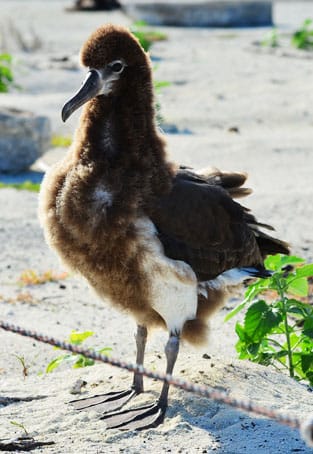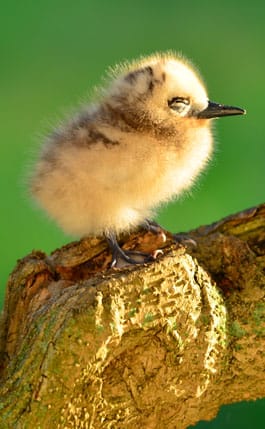
Our 10:30 pm arrival last night was not a strong enough reason for at least two people from our crew to not to get up and out before sunrise. With only one chance at the sunrise on Midway, how could one sleep in? Of course we had to go and explore when the day is just born, the beauty of the land is still fresh and all the unknown adventures lie ahead.
The bright white sandy beach was being just lit by the sun’s first rays, and the albatross were there to greet the sun. The adults were soaring high and swooping over the trees and coming in from the sea to their chicks. The chicks, birds the size of a small goose but skinnier, were everywhere by the thousands, on the roads, on the grass, near the Charlie Barracks hotel, on the beach, in the vegetation, on the sidewalks, on the boardwalks. You could not walk twenty feet without some chicks snapping their beak at you, or backing up clumsily while stretching the neck, peering sideways at you and falling on their fluffy butt and quickly picking themselves up, clacking their beak as if to say, I am not afraid, you just watch where you are going! The chicks were all in different stages of maturity and health, from semi-grown ones to quite small, nearly fully in the brown juvenile fuzz all over them.

The thick growths of irontrees were housing hundreds of terns. These beautiful white birds with large, dreamy black eyes and blue beaks, ending with a seriously sharp points, were flying everywhere and took interest in you if you were to stop walking near the treeline somewhere. The birds would fly very close to my face and hover some 2-3 feet away, making the distinctive “ti-r-r-t” noises, circling, joining up in pairs and flying in a fast arch, just to turn around and come back as if their curiosity got the better of them. This amazing aerial performance would last a few minutes, after which they would lose interest in you and fly away, back into the trees where they would perch on a branch, close their large eyes and momentarily fall asleep just to take off again a few seconds later.

Red tailed tropic birds were swooping in large circles among the trees, sometimes picking up aerial flights or arguments with each other, which caused them to bend and spin in the air, their red long tail feathers spiraling behind them, following their motion as would a trailing ribbon. I noticed that these birds were particularly relentless in chasing others from what must be their territory, for I have seen them chase and dive even on full grown albatross many times. The albatross did not seem to care much, sailing right on where they were initially going but the tropic birds, satisfied that the “enemy” was chased away, would then return to their patrol routes along the edges of the tree growth.
The entire feathery kingdom was dominated by the black, fork-tailed frigate birds. Soaring many hundreds of feet in the air, the frigates looked small from the ground but have a good 10 foot wingspan and a very small body in comparison. Beautiful fliers, frigates circled and glided so effortlessly that it looked like the gravity does not apply to these majestic travelers of the seas.

There were a few much smaller inhabitants of the avian world there, sitting motionless and content on their chosen branch, waiting to grow up and take off on their own. The sun heated up the little guys, making the yellow fluff on their bodies light up like a golden nimbus. I think these are tern chicks but I am not totally sure. Whoever they are, they are totally adorable and I spent quite a bit of time photographing them from different angles.
Inevitably we worked on instruments but finished by 2 pm to allow for the proper crew rest for the o’dark 30′ tomorrow take-off time. The afternoon was spent resting and taking care of endless project-related E-mail that was accumulating disproportionately in our mailboxes. When this important business finally got taken care of people spread out in different directions, and we took a “limo”, the 8-seater golf cart, and drove to the Turtle Beach. Swerving all over the road to steer clear of the albatross sitting everywhere we finally made it to the abandoned piers, offering the glimpse of turquoise blue water, and the beach, on which six green sea turtles were resting. 4-foot long, the turtles lay motionless on the beach, only occasionally turning their head or opening their eyes to take in the blue sea and white sand around them, their home and the only world they know how to live in. With pollution generated by the humans their world is becoming smaller every day, and even here, in the National Wildlife Refuge, the trash was washing up ashore everywhere. We were told by the Fish and Game biologists that all albatross chicks on the island have plastic in their stomachs, and once the volume of that swallowed trash becomes too large they no longer can hold food and starve to death.

You can see piles of bottle caps, baby pacifiers, disposable lighters and other plastic junk in the middle of their decomposing remains. Yet another reminder of how humans manage to disrupt just about every habitat on Earth with their careless way of life, all so much oriented around the disposable conveniences. Every day a worker, driving a dumpster cart around the small campus alone, collects and removes on average 200 dead albatross chicks, most dying from plastic ingestion. Of course with a 480,000 population, nobody can pick up all the dead birds elsewhere, and their remains are seen anywhere you happen to walk.
In the evening we enjoyed a swim in the ocean. The water at 28ºN was a very pleasant temperature, unlike the Saipan’s 30ºC water that almost did not freshen you up after swimming. The pristine white sand of the beach extended for a mile along the shore and for many hundreds of feet into the ocean, and had no rocks or any other unpleasantries on the bottom. We splashed and dove and the feeling of solitude and gentle calmness of the ocean was almost palpable.

In the distance we saw an albatross chick, fighting in the water. When they learn to fly the chicks sometimes land in the ocean, and, inexperienced, can’t properly fold their wings, which then become waterlogged. Once that happens the bird is pretty much doomed as it gets tired and eventually eaten by a shark, or drowns. We watched this one fight, splashing its wings and trying to paddle, making almost no progress to the sandy shore. Going to its rescue would be the typical human instinct but we probably shouldn’t, considering that 14-16 foot long tiger sharks come out in the evening to feed on these very birds. However, after watching the bird for half an hour I no longer could stand it and waded in chest deep water to the albatross. When it saw me approaching the exhausted bird pulled together whatever strength it had and pecked away at my hands, fighting for its life. I distracted it with one hand and grabbed its head from behind with the other, supporting the body and floating it along to the shore, whispering to it the wishes to never get wet again, grow up large, proud and fast, and sail above the foamy caps of the waves for thousands of miles, looking down at this small world. The bird gave up, fought no more and just dragged its six-foot wings in the water like flippers of a tired seal. Once it felt the ground, however, it redoubled the efforts to peck me so, not wanting to stress him any more I let go, and the hapless chick toddled up the sloping beach, dripping water off its feathers. He got lucky this time, and I hope he will become one of the albatross that grace the sky with their seven foot wings for many more years.

The day has ended, and I met its end standing waist deep in the water with the camera, hoping to take a picture of a green albatross overhead. The few that still flew around turned turquoise green in the evening light since the only light hitting them was green, from the ocean water. This turned out a difficult task, and I will try to remember this phenomenal sight and try to photograph it some time in the future, when the sun is down and the luminescent ocean lights up its magnificent seabirds with the last fading green glow.